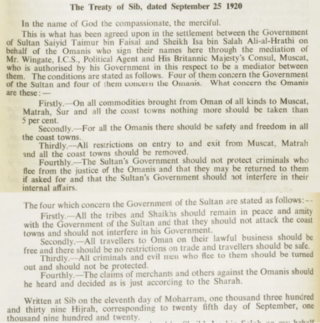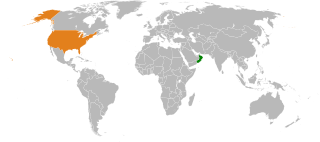| Tenure | Incumbent | Notes |
|---|
| Agents at Muscat |
|---|
| 1800 to 6 September 1800 | Archibald Hamilton Bogle | |
| 1801 to 1802 | David Seton | First time |
| 1802 to 1804 | David Seton | Second time |
| November 1804 to May 1805 | Vacant | |
| May 1805 to 2 August 1809 | David Seton | Third time |
| 1808 | W. Watts | Acting for Seton |
| September 1809 to 17 December 1809 | William Chicheley Bunce | |
| 1809 to 1810 | Nicholas Hankey Smith | |
| 1810 to 1840 | Vacant | |
| May 1840 to 1841 | Atkins Hamerton | Consul from 1841 |
| 1841 to May 1861 | residency located in the Sultanate of Zanzibar | See List of British representatives in Zanzibar |
| Political Agents |
|---|
| May 1861 to February 1862 | William M. Pengelley | |
| February 1862 to October 1862 | M. Green | |
| October 1862 to January 1863 | Unknown | Acting |
| January 1863 to February 1867 | Herbert Frederick Disbrowe | First time |
| March 1867 to February 1869 | George Andrew Atkinson | Acting |
| February 1869 to 8 January 1870 | Herbert Frederick Disbrowe | Second time |
| 8 January 1870 to 1 May 1871 | Alfred Cotton Way | |
| 8 May 1871 to 14 December 1872 | Edward Charles Ross | |
| 30 December 1872 to 7 June 1877 | Samuel Barrett Miles | First time |
| 7 June 1877 to 4 January 1878 | P. J. C. Robertson | Acting |
| 4 January 1878 to 14 June 1879 | Samuel Barrett Miles | Second time |
| 14 June 1879 to 16 July 1879 | Unknown | Acting |
| 16 July 1879 to 2 January 1880 | Charles Euan-Smith | |
| 28 February 1880 to 28 October 1880 | Charles Grant | First time |
| 28 October 1880 to 15 August 1881 | Samuel Barrett Miles | Third time |
| 16 August 1881 to 22 March 1883 | Charles Grant | Second time |
| 22 March 1883 to 20 April 1883 | Unknown | Acting |
| 20 April 1883 to 17 September 1883 | Edward Mockler | First time |
| 20 September 1883 to 2 April 1886 | Samuel Barrett Miles | Fourth time |
| 2 April 1886 to 25 October 1886 | Edward Mockler | Second time |
| 1 November 1886 to 16 April 1887 | Samuel Barrett Miles | Fifth time |
| 16 April 1887 to 2 March 1889 | Edward Mockler | Third time |
| 2 March 1889 to 30 March 1889 | Atmaram Sadarhiva Grovindin Jayakar | First time, acting |
| 31 March 1889 to 15 December 1889 | Wallace Christopher Ramsay Stratton | Acting |
| 16 December 1889 to 29 March 1890 | Charles Yate | |
| 29 March 1890 to 30 November 1890 | Atmaram Sadarhiva Grovindin Jayakar | Second time, acting |
| 1 December 1890 to 20 March 1891 | Edward Mockler | Fourth time |
| Consuls |
|---|
| 20 March 1891 to 14 October 1891 | Edward Mockler | |
| 14 October 1891 to 27 November 1892 | Atmaram Sadarhiva Grovindin Jayakar | First time, acting |
| 27 November 1892 to 19 April 1895 | James Hayes Sadler | First time |
| 19 April 1895 to 22 May 1895 | Atmaram Sadarhiva Grovindin Jayakar | Second time, acting |
| 23 May 1895 to 23 November 1895 | John Frederick Whyte | |
| 24 November 1895 to 17 April 1896 | James Hayes Sadler | Second time |
| 17 April 1896 to 12 June 1897 | Francis Granville Beville | |
| 12 June 1897 to 15 September 1897 | Atmaram Sadarhiva Grovindin Jayakar | Third time, acting |
| 16 September 1897 to 1 October 1899 | Christopher George Forbes Fagan | |
| 1 October 1899 to 2 January 1904 | Percy Cox | |
| 2 January 1904 to July 1906 | William George Grey | First time |
| July 1906 to November 1906 | William Henry Irvine Shakespear | Acting |
| November 1906 to April 1908 | William George Grey | Second time |
| April 1908 to July 1908 | N. Scott | Acting |
| July 1908 to November 1908 | Frank McConaghey | |
| November 1908 to April 1910 | Robert Erskine Holland | |
| April 1910 to April 1911 | Arthur Prescott Trevor | |
| April 1911 to March 1914 | Stuart George Knox | |
| March 1914 to October 1915 | Robert Arthur Edward Benn | |
| 15 October 1915 to 16 January 1916 | Hugh Stewart | First time |
| 16 January 1916 to 16 February 1916 | Claude Tulloch Ducat | First time |
| 17 February 1916 to 8 March 1916 | Hugh Stewart | Second time |
| 9 March 1916 to 14 June 1916 | Claude Tulloch Ducat | Second time |
| 15 June 1916 to 22 June 1916 | A. R. Burton | Acting |
| 23 June 1916 to 9 October 1916 | Evelyn Berkeley Howell | |
| 10 October 1916 to 7 November 1916 | Alan Richard Leopold King-Mason | Acting |
| 8 November 1916 to 12 October 1917 | Lionel Berkeley Holt Haworth | First time |
| 12 October 1917 to 30 November 1917 | John Macdonald Brickman | Acting |
| 1 December 1917 to 17 October 1919 | Lionel Berkeley Holt Haworth | Second time |
| 17 October 1919 to 3 March 1920 | Ronald Wingate | First time |
| 3 March 1920 to 10 April 1920 | Mehervanji Janishedji Gazdar | First time, acting |
| 11 April 1920 to 20 October 1921 | Ronald Wingate | Second time |
| 21 October 1921 to 28 February 1923 | Maitland Easton Rae | |
| 1 March 1923 to 11 September 1923 | Ronald Wingate | Third time |
| 11 September 1923 to 28 September 1923 | Mehervanji Janishedji Gazdar | Second time, acting |
| 28 September 1923 to 31 October 1924 | Reginald Graham Hinde | |
| 31 October 1924 to 24 May 1925 | Charles Gilbert Crosthwaite | First time |
| 24 May 1925 to 7 October 1925 | Reginald George Evelyn William Alban | First time, acting |
| 8 October 1925 to 12 February 1926 | Charles Gilbert Crosthwaite | Second time |
| 12 February 1926 to 9 September 1926 | Cyril Charles Johnson Barrett | |
| 10 September 1926 to 22 September 1926 | G. A. Richardson | Acting |
| 23 September 1926 to 15 June 1930 | George Patterson Murphy | |
| 15 June 1930 to 30 May 1931 | Trenchard Craven William Fowle | First time |
| 30 May 1931 to 31 October 1931 | Reginald George Evelyn William Alban | Second time, acting |
| 1 November 1931 to 25 July 1932 | Trenchard Craven William Fowle | Second time |
| 25 July 1932 to 13 November 1932 | Reginald George Evelyn William Alban | Third time, acting |
| 14 November 1932 to 23 March 1933 | Claude Edward Urquhart Bremner | First time |
| 23 March 1933 to 16 June 1933 | Reginald George Evelyn William Alban | Fourth time, acting |
| 17 June 1933 to 6 June 1935 | Claude Edward Urquhart Bremner | Second time |
| 6 June 1935 to 26 April 1939 | Ralph Ponsonby Watts | |
| 26 April 1939 to 3 April 1940 | Tom Hickinbotham | First time |
| 3 April 1940 to 26 July 1940 | John Baron Howes | First time, acting |
| 27 July 1940 to 14 August 1941 | Tom Hickinbotham | Second time |
| 14 August 1941 to 22 January 1942 | John Baron Howes | Second time, acting |
| 22 January 1942 to 22 May 1942 | Reginald George Evelyn William Alban | Fifth time, acting |
| 23 May 1942 to 21 September 1943 | Cornelius James Pelly | |
| 21 September 1943 to 31 October 1943 | Richard Ernest Rowland Bird | |
| 1 November 1943 to 1 November 1944 | Roy Douglas Metcalfe | |
| 1 November 1944 to 22 April 1945 | Arnold Crenshaw Galloway | |
| 22 April 1945 to 29 November 1945 | Ralph Ingram Hallows | |
| 1 December 1945 to 13 June 1947 | Charles Stewart | First time |
| November 1946 | Joseph Edward Havelock Hudson | Acting for Stewart |
| 13 June 1947 to August 1947 | Joseph Edward Havelock Hudson | |
| August 1947 to August 1948 | Charles Stewart | Second time |
| April 1948 to August 1948 | Patrick Desmond Stobart | Acting for Stewart |
| August 1948 to September 1949 | Randall Erskine Ellison | |
| July 1949 to September 1949 | R. McC. Andrew | Acting for Ellison |
| Consuls-General |
|---|
| September 1949 to October 1958 | Frederick Charles Leslie Chauncy | |
| October 1958 to May 1960 | William Neve Monteith | |
| May 1960 to May 1963 | John Fleetwood Stewart Phillips | |
| May 1963 to October 1965 | John Spenser Ritchie Duncan | |
| October 1965 to September 1969 | Derrick Charles Carden | |
| September 1969 to 1971 | David Crawford | Served at the time of the 1970 Omani coup d'état |
|
















